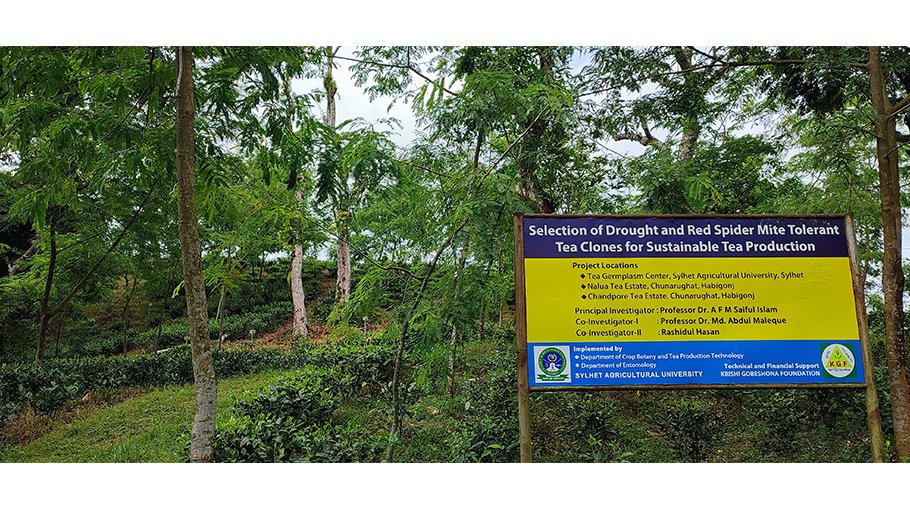Germ Plasm Centers set up to develop drought-tolerant tea varieties

Germ plasm center for various beverage crops including tea, coffee has been set up in the Tillaghera Green Campus of Sylhet Agricultural University (SAU) with an area of 2 acres. This orchard of edible crops also includes lemon grass, basil and cashew nuts. The medicinal properties of tea are widely appreciated due to its antioxidant content. For the past three years, the cultivation and research of this one of the economic crops of Bangladesh is going on in this germ plasm center. At the base of the shade trees used for shading the tea plants, pepper and the famous Chui Jhal tree of Khulna region are planted.
Germ Plasm founder and chief researcher Professor Dr. Md. Saiful Islam said that it is not possible to pick tea leaves in Bangladesh during drought for about 5 months from November to April. Therefore, the process of developing drought tolerant tea varieties is going on in Sylhet Agricultural University's tea garden.
Already the best varieties of tea seedlings have been collected from different gardens of the country and abroad. It is being tested whether tea plants can be sustained in natural environment by reducing the amount of irrigation. Also, what mites and other insects damage tea leaves are being studied and attempts are being made to develop mite and insect tolerant tea varieties.
He said that two types of tea are grown commercially in Bangladesh. One is Chinese tea or Camellia sinensis, the other is Assam tea or Camellia assamica. Asamika tea production is high in Sylhet region. And it is also in high demand for its strong malt flavor and large grains. But in terms of quality, BT-2 tea developed by Bangladesh Tea Research Institute is better. Research has shown that by increasing the density of Bt-2a forage, it is possible to increase the total production. Apart from 9 species of Indian Toklai species of tea plants, clones from BT-1 to BT-22 developed by Bangladesh Tea Research Institute are being cultivated in the research tea garden. Along with 1 biclonal variety and 4 Bangladeshi garden clones.
Just as young leaves are glistening on the tea trees of the research field, the coffee trees are also full of fruit. Coffee Arabica and Coffee Rovasta two types of coffee are being researched here. Coffee seedlings have been collected from hills of Chittagong Hill Tracts and various research institutes. In addition to the research on tea, there is research on the effect of coffee cultivation management, variety selection on coffee production.
Also, research is being done to increase the production and quality of coffee by shortening the fruit picking time and baking time. In addition, research is being done on three types of cashew nut varieties from Vietnam, Cambodia and mountainous regions.
This campus research project was a project of NATP at the initial stage. A germplasm center has now been set up with the financial and technical support of the Agricultural Research Foundation (KGF). Dr. Islam said that jute industry, sugar industry has been exhausted, conspiracy against tea industry is also going on. Tea is the favorite drink of the elderly from village to city. In Bangladesh the demand has increased day by day but the production has not increased accordingly. Keeping in mind the demand, the government has to import tea from foreign countries since 2015. He said that good quality green tea is sold at Tk 2,500-3,000 per kg in the market, but with the help of government and private sector, it will be possible to sell excellent quality green tea at Tk 1,200-1,500 per kg from this germ plasm center.



